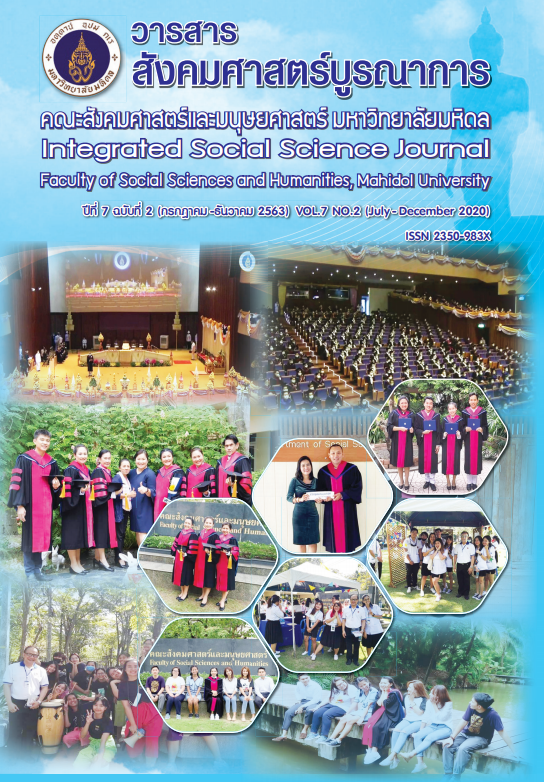Does Restructuring of Personal Income Tax in Thailand Reflect Good Tax Administration?
Main Article Content
บทคัดย่อ
Good tax administration can be examined from effectiveness, efficiency towards government and perceiving of equity, fairness and social acceptability towards taxpayers. Thailand restructured personal income tax in terms of tax deductions, tax allowances and tax rates in 2016 and 2018. Government mentioned taxpayers will obtain benefits from higher tax deduction, higher tax allowance, changing of tax rate and also new tax allowances. However, government will lost revenue collection. Researcher investigates whether or not restructuring of personal income tax generates good tax administration. Secondary data analysis and semi-structure interview from various related groups are used for data collection. Results found that restructuring of personal income tax reflects good tax administration in the aspect of social acceptability. However, in terms of fairness, equity and others may not reflect good tax administration.
Article Details
- วารสารสังคมศาสตร์บูรณาการ มหาวิทยาลัยมหิดล อนุญาตให้สามารถนำไฟล์บทความไปใช้ประโยชน์และเผยแพร่ต่อได้ โดยอยู่ภายใต้เงื่อนไขสัญญาอนุญาต CC Attribution-NonCommercial-NoDerivatives 4.0 International (CC BY-NC-ND 4.0) โดยต้องแสดงที่มา/การอ้างอิงจากวารสาร – ไม่ใช้เพื่อการค้า – ห้ามแก้ไขดัดแปลงเนื้อหา
- ข้อความที่ปรากฏในบทความในวารสารฯ เป็นความคิดเห็นส่วนตัวของผู้เขียนแต่ละท่าน ไม่เกี่ยวข้องกับกองบรรณาธิการวารสารฯ (ซึ่งหมายรวมถึง บรรณาธิการ ผู้ทรงคุณวุฒิในกองบรรณาธิการ หรือ บรรณาธิการรับเชิญ) แต่อย่างใด ความรับผิดชอบองค์ประกอบทั้งหมดของบทความแต่ละเรื่องเป็นของผู้เขียนแต่ละท่าน หากมีความผิดพลาดใด ๆ ผู้เขียนแต่ละท่านจะรับผิดชอบบทความของตนเอง ตลอดจนความรับผิดชอบด้านเนื้อหาและการตรวจร่างบทความเป็นของผู้เขียน ไม่เกี่ยวข้องกับกองบรรณาธิการวารสารฯ
- กองบรรณาธิการขอสงวนสิทธิ์ในการตัดทอน/ปรับแก้ถ้อยคำบางประการเพื่อความเหมาะสม
เอกสารอ้างอิง
Dabla-Norris, E., Misch, F., Cleary, D. & Khwaja, M. (2017). Tax administration and firm performance: new data and evidence from emerging markets and developing economies, IMF Working Paper, WP/17/95, IMF, Washington, DC.
Erard, B. & Ho, C. C. (2003). Explaining the US income tax compliance continuum. Ejournal of Tax Research, 1(2), 93-105.
Frampton, D. (1993). Practical Tax Administration, The Looseleaf Company, Melksham, Wilts.
Gaspar, V. & Jaramillo, L. (2017). Designed for growth: taxation and productivity. Fiscal Monitor, IMF, April, Washington, DC.
James, S. and Nobes. C. (2017). The Economics of Taxation (17th Edition Updated), Financial
Time, Prentice Hall.
James, S., Sawyer, A. and Budak, T. (2016). The Complexity of Simplification Experiences from Around The World, Palgrave Macmillan.
Kamasa, K., Adu. G. & Oteng-Abayie, E.F. (2019). Firm productivity in Sub-Saharan Africa: how relevant is quality of tax administration?. African Journal of Economic and Management Studies, 11(1), 75-90.
OECD Committee of Fiscal Affairs Forum on Strategic Management (2001), Principles of Good Tax Administration, Centre for Tax Policy and Administration.
Oliver, T. & Bartley, S. (2005). Tax system complexity and compliance costs – some theoretical considerations,Economic Roundup, The Treasury, Australian Government, 3, 53-68.
Rojjanavanich, P. et al. (2018). Revenue Tax: The Revenue Code, Bangkok : Samcharoenpanich
Ltd. ( in Thai)
ไพจิตร โรจนวานิช ชุมพร เสนไสยและ สาโรช ทองประคำ. (2561). คำอธิบายประมวลรัษฎากร ภาษีสรรพากร. กรุงเทพ:
สามเจริญพาณิชย์.
Sato, M. and Shimizu, Y. (2005), ‘Tax policy and reform in Asian countries’, Journal of Asian Economics, 16, 907-909.
Smith, A. (1776). An Inquiry into the Nature and Causes of the Wealth of Nations. 1 (1 ed.). London: W. Strahan


